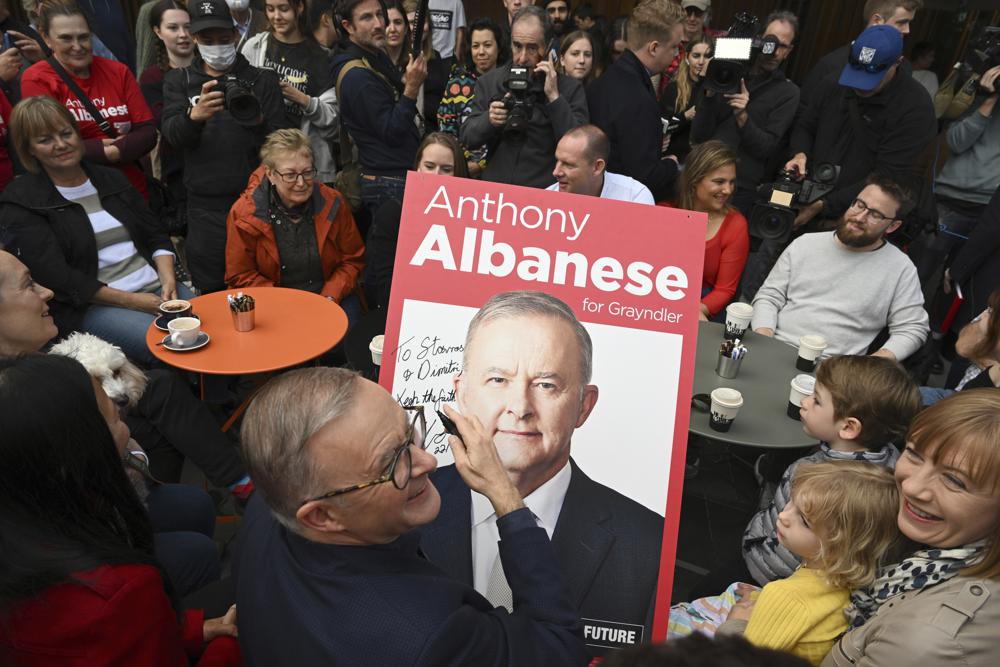News
Australia Elects Progressive Labor Party Prime Minister

On Sunday morning, Australia awoke to a new prime minister in Anthony Albanese, the center-left Labor Party leader whose ascent to the nation’s top job follows his upbringing in social housing by a single mother living on disability benefits.
Now former Prime Minister Scott Morrison announced that he would step down as Liberal leader after an internal party coup in 2018.
As the only candidate with a “non-Anglo Celtic name” to run for prime minister in 121 years, the 59-year-old politician referred to his humbling upbringing in Camperdown, an inner-Sydney suburb. He thanked voters for making him the country’s 31st leader.
In his victory speech after edging out conservative Prime Minister Scott Morrison to end nine years of conservative rule, Albanese told jubilant supporters: “It says a lot about who we are as a country that the son of a single mom living in public housing who grew up in Camperdown can stand before you tonight as Australia’s prime minister.”
Every parent wants more for their children than they had. It was my mother’s dream. “I hope my life story inspires Australians to dream big,” he said.
The results of Saturday’s election, which analysts described as extremely complicated, reflect the reality of modern Australia, and it’s unclear whether Albanese’s party will be able to form a majority government or whether it will need to count on an increased number of independents and minor party lawmakers.
With postal votes still to be counted, Albanese may need to be sworn in as acting prime minister before he can attend Tuesday’s Quad summit in Tokyo.
Two-Party System Shaken in Australia
Australia’s traditional two-party system was shaken by the election, as Labor took major defeats, as did the coalition of the outgoing Prime Minister of the Liberal party, Scott Morrison. Many seats considered Labor or coalition strongholds were lost to fringe parties and independents.
Labor needed 76 seats in the lower chamber, the House of Representatives, to govern in its own right and was being declared the winner on Sunday evening with 71% of votes counted, according to the Australian Broadcasting Corporation.
With 52 seats, the Liberal-National coalition did much worse than its bare majority of 76 in the 2019 election. Many analysts describe the result as a rejection of Morrison’s handling of many issues in his three-year term, including climate, COVID-19, women’s rights, political integrity, and natural disasters such as bushfires and floods.
There were 15 independents, and minor party candidates declared for the election. Three of them were members of the environment-centric Green Party, while 12 were non-aligned politicians, including nine so-called teal independents. If the seven seats yet to be decided are won by Labor, it may need support from some of those winners.
Australian Candidates Women
A new wave of independent parties in Australia calls for stronger action by the government on reducing Australia’s greenhouse gas emissions than the government or Labor would.
The teal independents are marketed as greener than the Liberal Party’s traditional blue color and demand stronger government action than either the government or Labor proposes.
Most of their successful candidates are women, and their rise is seen partly as a rejection of Morrison for his handling of gender issues, including the sexual harassment scandals that rocked Parliament during his last three years.
As of Sunday morning, Labor will either form a majority or minority government. Support for both major parties decreased, with support for the coalition dropping by more than 6% and Labor’s vote falling by around 1.2%.
Raising the Minimum Wage
Albanese promised to bring Australians together, increase investment in social services, and end the war on climate change.
As Australia grapples with the highest inflation since 2001 and soaring housing prices, Labor has promised more financial aid and a stronger social safety net.
It also plans to raise the minimum wage, and on the foreign policy front, it proposed setting up a Pacific defense school to train neighboring armies in response to China’s potential military presence in the Solomon Islands.
Climate change will be addressed with a 43% reduction in greenhouse gas emissions by 2030 and net no emissions by 2050.






























